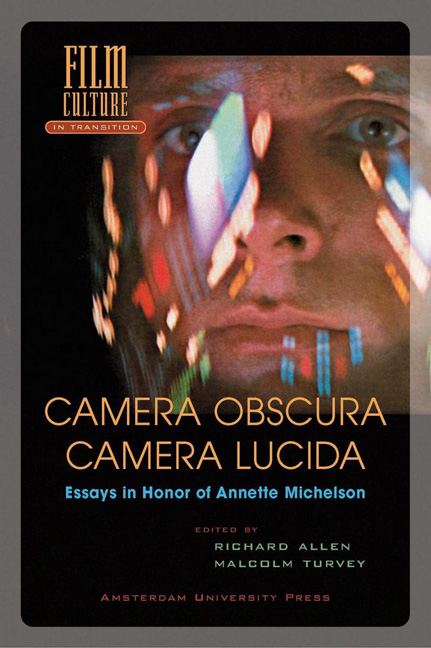Book contents
- Frontmatter
- Contents
- Acknowledgements
- Preface
- Introduction
- The Logic of an Illusion: Notes on the Genealogy of Intellectual Cinema
- Narcissistic Machines and Erotic Prostheses
- Loïe Fuller and the Art of Motion: Body, Light, Electricity and the Origins of Cinema
- Visitings of Awful Promise: The Cinema Seen from Etna
- Transfiguring the Urban Gray: László Moholy-Nagy’s Film Scenario ‘Dynamic of the Metropolis’
- Eisenstein’s Philosophy of Film
- Knight’s Moves
- Hitchcock and Narrative Suspense: Theory and Practice
- From the Air: A Genealogy of Antonioni’s Modernism
- Dr. Strangelove: or: the Apparatus of Nuclear Warfare
- Collection and Recollection: On Film Itineraries and Museum Walks
- Afterward: A Matter of Time: Analog Versus Digital, the Perennial Question of Shifting Technology and Its Implications for an Experimental Filmmaker’s Odyssey
- Select Bibliography
- List of Contributors
- Index
- Film Culture in Transition General Editor: Thomas Elsaesser
Visitings of Awful Promise: The Cinema Seen from Etna
Published online by Cambridge University Press: 25 January 2021
- Frontmatter
- Contents
- Acknowledgements
- Preface
- Introduction
- The Logic of an Illusion: Notes on the Genealogy of Intellectual Cinema
- Narcissistic Machines and Erotic Prostheses
- Loïe Fuller and the Art of Motion: Body, Light, Electricity and the Origins of Cinema
- Visitings of Awful Promise: The Cinema Seen from Etna
- Transfiguring the Urban Gray: László Moholy-Nagy’s Film Scenario ‘Dynamic of the Metropolis’
- Eisenstein’s Philosophy of Film
- Knight’s Moves
- Hitchcock and Narrative Suspense: Theory and Practice
- From the Air: A Genealogy of Antonioni’s Modernism
- Dr. Strangelove: or: the Apparatus of Nuclear Warfare
- Collection and Recollection: On Film Itineraries and Museum Walks
- Afterward: A Matter of Time: Analog Versus Digital, the Perennial Question of Shifting Technology and Its Implications for an Experimental Filmmaker’s Odyssey
- Select Bibliography
- List of Contributors
- Index
- Film Culture in Transition General Editor: Thomas Elsaesser
Summary
Sometime during late June 1923, in a hotel in Catania, Sicily, the 26-year-old French filmmaker and film theorist Jean Epstein rang for the elevator to the lobby seven floors below. He had come to Sicily to shoot Mt. Etna's eruption for his fifth film, the documentary LA MONTAGNE INFIDÈLE, now unfortunately lost. The plaintive cries of the night concierge trapped between floors in the elevator cabin gave notice that he would need to use the stairs, and Epstein began to walk down a spiral staircase lined with mirrors, what the French call a miroir à vis. He would later recount his descent in one of his most striking, though still insufficiently appreciated, speculative texts, ‘Le Regard du verre’ (‘The Mirror's Gaze’). ‘This immense spiral of stairs,’ he wrote, ‘portended vertigo’:
The entire shaft was lined with mirrors. I descended surrounded by many selves, by reflections, by images of my gestures, by cinematic projections. At every turn I was caught from another angle. There are as many different and independent positions between a profile and a three-quarter view as there are tears in an eye. Each of these images lived but an instant, no sooner caught sight of than lost from view, already something else. Only my memory could hold on to one of their infinite number, and by doing so, missed two of every three.Athird of the images gave birth to secondary images. An algebra and descriptive geometry of gestures came to light. Certain movements were divided over and over; others were multiplied. I tilted my head and to my right I saw only the square root of a gesture, but to the left, this gesture was raised to the eighth power. Looking at one, then the other, I acquired a different conception of my three-dimensionality. Parallel perceptions accorded perfectly with each other, reverberated against each other, reinforced each other, and then were extinguished, like an echo, but with a speed far greater than acoustical ones. Tiny gestures became very large … This staircase was the eye of another sort of tyrant and an even greater spy. I descended as if moving across the optical facets of an immense insect. The opposing angles of other images cut across and amputated each other; reductive and fragmentary, they humiliated me.
- Type
- Chapter
- Information
- Camera Obscura, Camera LucidaEssays in Honor of Annette Michelson, pp. 91 - 108Publisher: Amsterdam University PressPrint publication year: 2003



